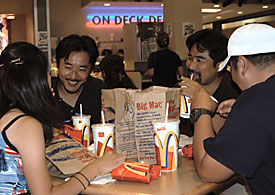 |
|
MELISSA HALTERMAN/Arizona Summer Wildcat
|
English as a Second Language students Takanaru Kimura, 31 , and Yuji Inoue, 34 , eat lunch in the Student Union food court. McDonalds is one of the fast food options to be found in the Student Union.
|
|
By Ty Young
Arizona Summer Wildcat
Wednesday July 23, 2003
As first-year students adapt to a new atmosphere with more opportunities on campus, they may unknowingly welcome a condition that often takes an entire semester to diagnose and years to overcome.
It lies in wait while students cram for tests, step out to nearby restaurants and join their newfound friends at parties and social events. Eventually, the condition springs on the unsuspecting student still adjusting to the college lifestyle.
This condition has been dubbed the "Freshman 15" and it could be lurking for any incoming students unprepared for the many choices that await them.
The fabled Freshman 15 refers to the weight that some college students gain during their first year in school.
Gale Begeman, nutrition counselor for Campus Health Services, has been advising students at the University of Arizona on how to properly manage their weight during not only their freshman year, but throughout their entire time in school. She pointed to the change in atmosphere as the main culprit behind this first-year weight gain.
"A lot of people coming into college have been involved in athletics and other physical activities in high school. When they get here, they don't keep up the same routine," she said. "The combination of opportunity and students ╬finding themselves' can be very stressful."
For Mary Ann Pacheco, a finance sophomore who gained 20 pounds by the end of her freshman year, stress was often so overwhelming that she no longer thought of her diet as a priority. After years of proper nutrition and healthy living, Pacheco said she learned the hard way that the college atmosphere often invites weight gain.
"When you have a 10-page paper due the next day, working out is not on your mind," she said. "Your health, working out and eating right isn't a priority any more."
Begeman said students often turn to food to relieve their stress because of the large number of restaurants within walking distance.
"(Coming to college) is a pretty big move," she said. "It is stressful for anybody. Food is nurturing and readily available on campus."
The Student Union Memorial Center houses some of the most easily accessible restaurants on campus, but the vendors are usually not associated with the "healthy diet." This is not to say that student union officials did not try, however.
Prior to the completion of the student union, surveys were distributed throughout the UA student community. The surveys listed a number of potential food choices, including both typical "fast-food" and healthy alternatives.
David Galbraith, associate director of Arizona Student Unions, said the responses to the surveys had a lot to do with the vendors that were chosen.
"What we saw from the surveys was that they wanted your hamburgers, pizza and Asian cuisine," he said. "That's what is driving (vendor choices). The other food types didn't rate as high."
Galbraith added that there have always been opportunities for restaurants that offer healthier options, but the dynamics of the school year often scare businesses away. With an eight-month school year, the drop-off over the summer months is often too much to overcome.
"The reality is that it is really difficult to survive on an 8-month income stream," he said. "Most of your healthy-living restaurants are small independents. It just costs too much money."
Pacheco, who has lost half of the weight she put on during her first year, said there was a direct correlation between her eating habits and the choices she made during her first year. Of the weight she gained during her first year, she said most of it was at the hands of the local campus restaurants.
"I went from eating home-cooked meals to eating fast-food for breakfast, lunch and dinner," she said. "Other than the natural occurrence when women gain weight when they turn 18, it was the change in eating habits."
Pacheco also said her drinking habits more than likely added to her first-year weight gain. Despite a strong push by the university to stop alcohol consumption on campus, she said drinking is a reality that students face when they enter their first year of school.
According to Begeman, drinking is one of the problematic choices that students encounter, regardless of dietary ramifications. When students mix late night drinking into their stressful lives, the potential for weight gain skyrockets.
Of course there is also alcohol, which is a big part of (weight-gain) and all the late night munchies that go along with it," she said.
"You can do whatever you want, eat whatever you want and sleep ╬til whenever you want," is an attitude that many students adopt, Begemen said.
However, that attitude could go to your waistline.

